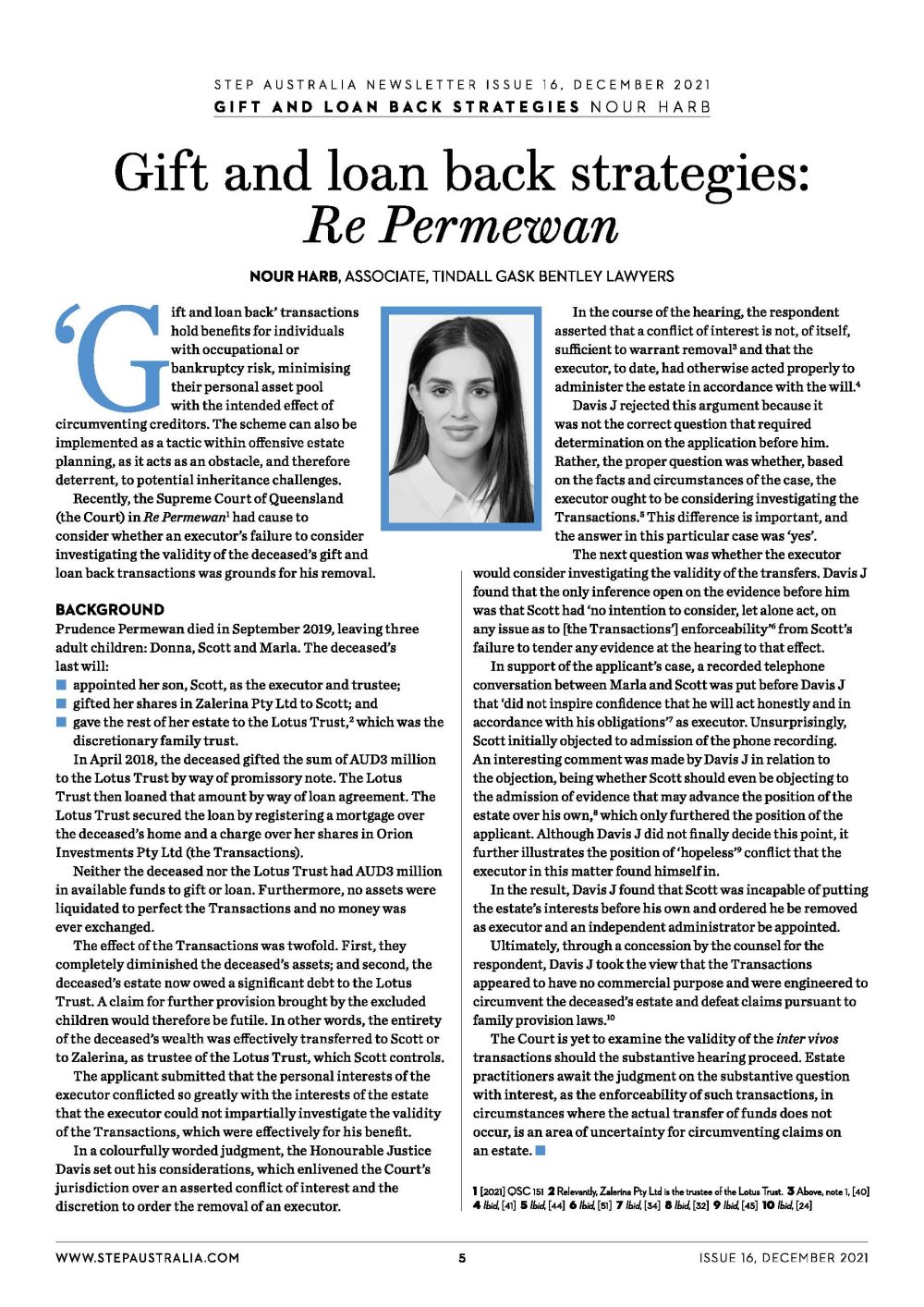Gift and loan back strategies: Re Permewan
The Court is yet to examine the validity of the inter vivos transactions should the substantive hearing proceed. Estate practitioners await the judgment on the substantive question with interest, as the enforceability of such transactions, in circumstances where the actual transfer of funds does not occur, is an area of uncertainty for circumventing claims on an estate.

Gift and loan back’ transactions hold benefits for individuals with occupational or bankruptcy risk, minimising their personal asset pool with the intended effect of circumventing creditors. The scheme can also be implemented as a tactic within offensive estate planning, as it acts as an obstacle, and therefore deterrent, to potential inheritance challenges. Recently, the Supreme Court of Queensland (the Court) in Re Permewan1 had cause to consider whether an executor’s failure to consider investigating the validity of the deceased’s gift and loan back transactions was grounds for his removal.
BACKGROUND
Prudence Permewan died in September 2019, leaving three adult children: Donna, Scott and Marla. The deceased’s last will: • appointed her son, Scott, as the executor and trustee; • gifted her shares in Zalerina Pty Ltd to Scott; and • gave the rest of her estate to the Lotus Trust, which was the discretionary family trust. In April 2018, the deceased gifted the sum of AUD3 million to the Lotus Trust by way of promissory note. The Lotus Trust then loaned that amount by way of loan agreement. The Lotus Trust secured the loan by registering a mortgage over the deceased’s home and a charge over her shares in Orion Investments Pty Ltd (the Transactions).
Neither the deceased nor the Lotus Trust had AUD3 million in available funds to gift or loan. Furthermore, no assets were liquidated to perfect the Transactions and no money was ever exchanged.
The effect of the Transactions was twofold. First, they completely diminished the deceased’s assets; and second, the deceased’s estate now owed a significant debt to the Lotus Trust. A claim for further provision brought by the excluded children would therefore be futile. In other words, the entirety of the deceased’s wealth was effectively transferred to Scott or to Zalerina, as trustee of the Lotus Trust, which Scott controls. The applicant submitted that the personal interests of the executor conflicted so greatly with the interests of the estate that the executor could not impartially investigate the validity of the Transactions, which were effectively for his benefit. In a colourfully worded judgment, the Honourable Justice Davis set out his considerations, which enlivened the Court’s jurisdiction over an asserted conflict of interest and the discretion to order the removal of an executor.
In the course of the hearing, the respondent asserted that a conflict of interest is not, of itself, sufficient to warrant removal and that the executor, to date, had otherwise acted properly to administer the estate in accordance with the will. Davis J rejected this argument because it was not the correct question that required determination on the application before him. Rather, the proper question was whether, based on the facts and circumstances of the case, the executor ought to be considering investigating the Transactions. This difference is important, and the answer in this particular case was ‘yes’. The next question was whether the executor would consider investigating the validity of the transfers. Davis J found that the only inference open on the evidence before him was that Scott had ‘no intention to consider, let alone act, on any issue as to [the Transactions’] enforceability’ from Scott’s failure to tender any evidence at the hearing to that effect. In support of the applicant’s case, a recorded telephone conversation between Marla and Scott was put before Davis J that ‘did not inspire confidence that he will act honestly and in accordance with his obligations’ as executor. Unsurprisingly, Scott initially objected to admission of the phone recording. An interesting comment was made by Davis J in relation to the objection, being whether Scott should even be objecting to the admission of evidence that may advance the position of the estate over his own, which only furthered the position of the applicant. Although Davis J did not finally decide this point, it further illustrates the position of ‘hopeless’ conflict that the executor in this matter found himself in.
In the result, Davis J found that Scott was incapable of putting the estate’s interests before his own and ordered he be removed as executor and an independent administrator be appointed. Ultimately, through a concession by the counsel for the respondent, Davis J took the view that the Transactions appeared to have no commercial purpose and were engineered to circumvent the deceased’s estate and defeat claims pursuant to family provision laws.
The Court is yet to examine the validity of the inter vivos transactions should the substantive hearing proceed. Estate practitioners await the judgment on the substantive question with interest, as the enforceability of such transactions, in circumstances where the actual transfer of funds does not occur, is an area of uncertainty for circumventing claims on an estate.
First published: S T E P A U S T R A L I A N E W S L E T T E R I S S U E 1 6 , D E C E M B E R 2 0 2 1
Gift and loan back strategies: Re Permewan NOUR HARB, ASSOCIATE, TINDALL GASK BENTLEY LAWYERS